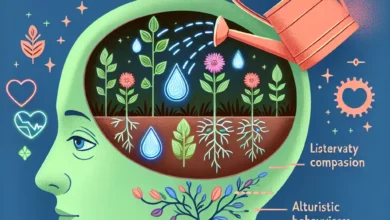20 Powerful Empathy Phrases to Strengthen Your Relationships

Understanding the Power of Empathetic Communication
Have you ever felt truly heard and understood by someone? That warm feeling is empathy in action. Empathy is like a bridge connecting hearts and minds. It’s the ability to understand and share others’ feelings. In our relationships, empathy acts as a powerful glue.
Empathy is crucial in both personal and professional settings. A 2021 survey by the Workforce Institute revealed an interesting fact. 90% of people believe empathy is vital for positive work environments. But empathy isn’t just for work. It’s key in all our relationships.
How can we become more empathetic? One simple way is by using specific phrases. These “empathy phrases” can strengthen our connections with others. They show we care and understand. In this article, we’ll explore 20 powerful empathy phrases and how to use them effectively.
Why Empathetic Language Matters
Empathetic language creates a safe space for open communication. Dr. Brené Brown, a renowned empathy researcher, offers valuable insights. She explains that empathy is a vulnerable choice. It connects us to something bigger than ourselves.
Let’s look at a quick example:
Imagine your friend didn’t get a job they wanted. You have two ways to respond:
- “Don’t worry, you’ll find something else.”
- “That must be really disappointing. I’m here for you.”
The second response shows empathy. It acknowledges their feelings and offers support. This small change in wording can make a big difference.
Using empathetic phrases like this brings several benefits:
- Stronger emotional connections: People open up when they feel understood.
- Better conflict resolution: Empathy helps us see different perspectives.
- Increased trust: Showing empathy builds a foundation of trust.
- Improved understanding: We gain deeper insights into others’ experiences.

Empathetic language is a powerful tool in building relationships. It helps us connect on a deeper level. By using empathy phrases, we show others that we care. We create an environment where people feel safe to share their thoughts and feelings.
How to Use Empathy-Enhancing Phrases Effectively
Using empathy phrases isn’t just about the words. It’s about how you say them. Here are some guidelines to help you use these phrases effectively:
- Be genuine: Mean what you say. Insincerity can damage relationships.
- Listen actively: Pay attention to both words and body language.
- Use appropriate tone: Your voice should match the situation’s emotion.
- Consider timing: Choose the right moment to offer empathy.
- Practice patience: Allow the other person time to express themselves fully.
Context is crucial when using empathy phrases. A phrase that works well in one situation might not fit another. Always consider the specific circumstances before choosing your words.
Common mistakes to avoid when using empathy phrases:
- Interrupting the speaker
- Offering unsolicited advice
- Comparing their experience to yours
- Minimizing their feelings
- Using a dismissive tone
By avoiding these pitfalls, you can ensure your empathy is well-received.
20 Powerful Empathy Phrases and When to Use Them
Now, let’s explore 20 empathy phrases divided into four categories. Each category serves a different purpose in empathetic communication.
1. Phrases for Active Listening
Active listening shows you’re fully engaged in the conversation. Use these phrases to demonstrate your attention:
- “I’m here to listen.”
Use when: Someone needs to vent or share a problem. - “Can you tell me more about that?”
Use when: You want to encourage deeper sharing. - “What I’m hearing is… Is that right?”
Use when: You want to confirm your understanding. - “That sounds challenging.”
Use when: Someone is describing a difficult situation. - “Take your time. I’m listening.”
Use when: Someone is struggling to express themselves.

2. Phrases for Showing Understanding
These phrases help validate the other person’s experiences and emotions:
- “I can see why you feel that way.”
Use when: You want to acknowledge someone’s perspective. - “That must be really tough for you.”
Use when: Someone is going through a difficult time. - “I’ve felt similar feelings before.”
Use when: You can relate to their experience (but don’t shift focus to yourself). - “Your feelings are valid.”
Use when: Someone is doubting or dismissing their own emotions. - “It makes sense that you’d react that way.”
Use when: Someone is explaining their response to a situation.
3. Phrases for Offering Support
These phrases show you’re there to help and support:
- “How can I support you right now?”
Use when: You want to offer concrete help. - “I’m here for you, whatever you need.”
Use when: You want to express unconditional support. - “You’re not alone in this.”
Use when: Someone feels isolated or overwhelmed. - “Let’s work through this together.”
Use when: You can actively help solve a problem. - “Your feelings matter to me.”
Use when: You want to emphasize the importance of their emotions.
4. Phrases for Validating Feelings
These phrases acknowledge and affirm the other person’s emotions:
- “It’s okay to feel this way.”
Use when: Someone is struggling with difficult emotions. - “Your feelings are important.”
Use when: You want to emphasize emotional validation. - “I appreciate you sharing this with me.”
Use when: Someone opens up about something personal. - “This situation would be hard for anyone.”
Use when: Someone is being hard on themselves. - “You have every right to feel upset/angry/sad.”
Use when: Someone is questioning their emotional response.
These empathy phrases can significantly improve your communication. They help create a supportive and understanding environment.
Putting These Phrases into Practice
Using empathy phrases effectively takes practice. Here’s a step-by-step guide to help you incorporate them into your conversations:
- Listen carefully: Pay attention to the speaker’s words and tone.
- Identify emotions: Try to understand what the person is feeling.
- Choose an appropriate phrase: Select a phrase that fits the situation.
- Deliver sincerely: Use a genuine tone and body language.
- Allow for response: Give the person time to react or continue sharing.
- Follow up: Ask how you can support them further if needed.
Let’s look at two practice scenarios to see these steps in action:
Scenario 1: A friend didn’t get a promotion they wanted.
You: “That must be really disappointing. Can you tell me more about how you’re feeling?”
Friend: “I just feel like all my hard work was for nothing.”
You: “I can see why you feel that way. Your feelings are valid. How can I support you right now?”
Scenario 2: A coworker is struggling with a difficult project.
You: “This project sounds challenging. What I’m hearing is that you’re feeling overwhelmed. Is that right?”
Coworker: “Yes, exactly. I don’t know where to start.”
You: “It’s okay to feel this way. Let’s work through this together. What part is most daunting for you?”
Remember, practice makes perfect. The more you use these phrases, the more natural they’ll become.
Common Challenges and Solutions
Even with practice, you might face some difficulties. Here are some common challenges and how to overcome them:
| Challenge | Solution | Example Phrase |
|---|---|---|
| Feeling awkward or insincere | Start small and build up | “I’m here to listen if you want to talk.” |
| Not knowing what to say | Use open-ended questions | “How did that make you feel?” |
| Accidentally dismissing feelings | Acknowledge before problem-solving | “I understand you’re frustrated. Would you like to brainstorm solutions together?” |
| Overusing phrases | Vary your responses | Mix phrases with attentive silence and non-verbal cues |

Building Long-term Empathy Skills
Developing empathy is an ongoing process. Here are some daily practices to enhance your empathy skills:
- Practice active listening in everyday conversations
- Read fiction to experience different perspectives
- Volunteer for causes you care about
- Reflect on your own emotions regularly
- Seek feedback on your communication style
To track your progress, consider keeping an empathy journal. Note situations where you used empathy phrases and how they were received. This can help you identify areas for improvement.
Additional resources for building empathy:
- Books like “Nonviolent Communication” by Marshall Rosenberg
- Online courses on emotional intelligence
- Empathy-building workshops or support groups
Remember, becoming more empathetic is a journey, not a destination. Be patient with yourself as you develop these skills.
Wrapping Up: The Power of Empathy in Relationships
Empathy is a vital skill in building strong relationships. It helps us connect on a deeper level. By using empathy phrases, we create a safe space for open communication.
Let’s recap the key points we’ve covered:
- Empathy matters: It strengthens bonds in all types of relationships.
- Empathy phrases work: They show understanding and support.
- Practice is key: Using these phrases gets easier over time.
- Context is crucial: Choose phrases that fit the situation.
- Challenges are normal: Overcoming them improves your skills.
- Long-term development: Empathy is an ongoing journey.
Remember, the goal isn’t perfection. It’s about genuine connection and understanding. Every time you use an empathy phrase, you’re building stronger relationships.

Your Call to Action: Start Your Empathy Journey Today
Now it’s your turn to put these empathy phrases into practice. Here’s what you can do:
- Choose one phrase: Pick an empathy phrase that resonates with you.
- Use it today: Find an opportunity to use this phrase in a conversation.
- Reflect: Think about how it felt and how the other person responded.
- Repeat: Try a new phrase each day this week.
Remember, small steps lead to big changes. Your efforts to show empathy can make a significant difference in your relationships.
As you practice, be patient with yourself. Learning new communication skills takes time. Celebrate your progress, no matter how small it seems.
Final Thoughts
Empathy is a powerful tool for building stronger relationships. It helps us understand each other better. By using empathy phrases, we create deeper connections.
Start your journey towards more empathetic communication today. Your relationships will thank you for it. And who knows? You might inspire others to be more empathetic too.
Thank you for reading this guide on empathy phrases for relationships. We hope it helps you in showing empathy in conversations and building stronger relationships with empathy.
Do you have any favorite empathy phrases? Share them with friends and family. Together, we can create a more understanding and compassionate world.



